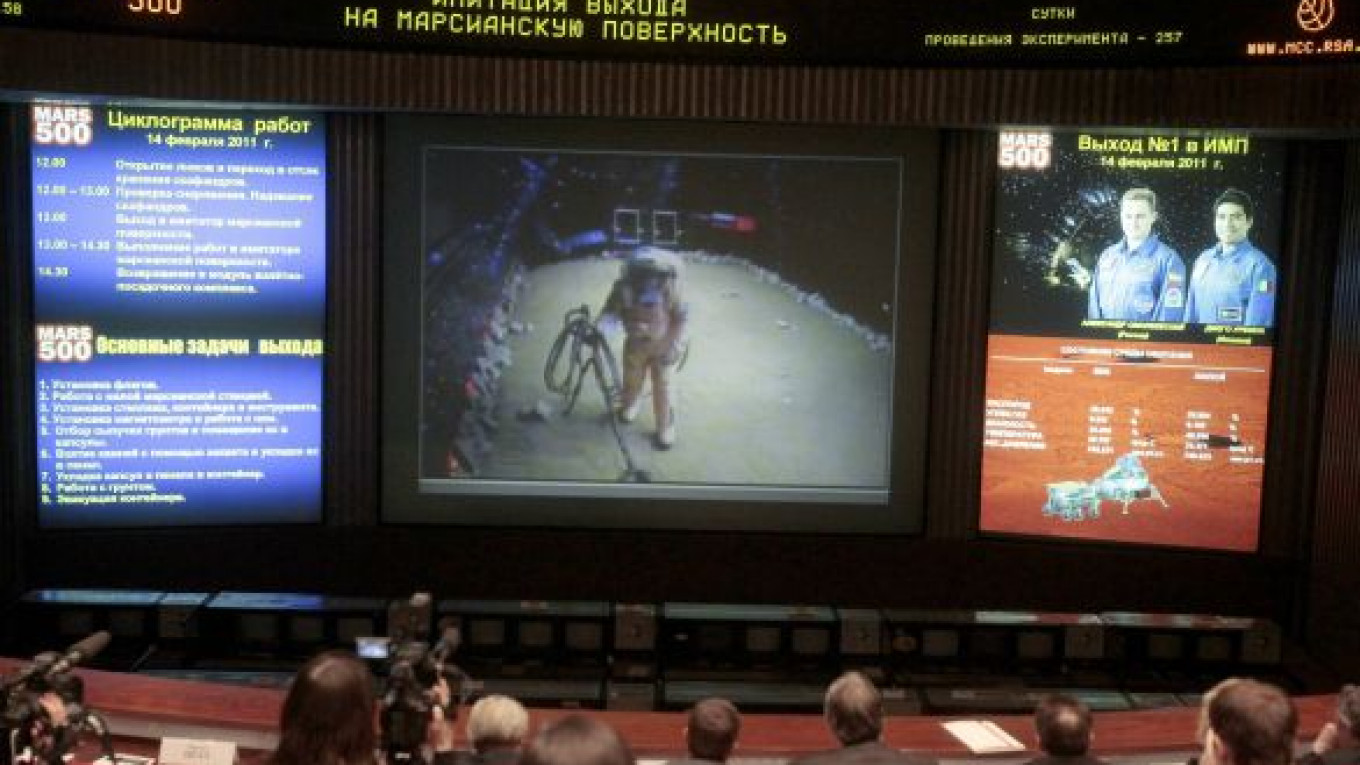KOROLYOV — After 257 days in a locked steel capsule, researchers on a mock trip to Mars ventured from their cramped quarters Monday in heavy space suits, trudging into a sand-covered room to plant flags on a simulated Red Planet.
The crew of three Russians, a Frenchman, an Italian-Colombian and a Chinese entered a network of modules at a Moscow research center last June to imitate the 520-day flight and see how they cope with the constricted, isolating conditions of space travel — minus the weightlessness.
Several participants donned 30-kilogram suits to perform Monday's mock landing in an adjacent capsule. They planted the flags of Russia, China and the European Space Agency, took "samples" from the ground and conducted faux scientific experiments.
"All systems have been working normally. The crew are feeling fine," said Vitaly Davydov, deputy head of the Russian space agency.
Psychologists said long confinement would put the team members under stress as they grow increasingly tired of each other's company. Psychological conditions can even be more challenging on a mock mission than a real flight because the crew won't experience any of the euphoria or dangers of actual space travel.
Davydov described the experiment as an important part of preparation for flight to Mars and predicted that the real mission could take place in about 20 years, but only with international cooperation.
Martin Zell, a European Space Agency official overseeing the experiment, called the mission a "really strong asset for future undertakings of mankind in space, for its ambition to fly finally to the Red Planet."
The facility for the experiment is in western Moscow and includes living compartments the size of a bus connected with several other modules for experiments and exercise. The video footage of the landing was shown on a big screen at Russia's Mission Control Center in Korolyov outside Moscow, which is used to handle manned missions to the international space stations.
The mission director has said the experiment could be disrupted for medical or technical reasons, or if some of the participants demand that it be stopped.
So far the crew has been doing just fine. "After a couple of weeks they were really a team, certainly with some temporary ups and downs of individual crew members," Zell said.
"A big challenge is missing daylight, missing visual perceptions," he said. "They also have to live with the food which they have on board and with the air which they have on board."
The crewmen communicate with the organizers and their families via the Internet — delayed and occasionally disrupted to imitate the effects of space travel. They eat canned food similar to that currently offered on the International Space Station.
A similar experiment in 1999-2000 at the same Moscow institute went awry when a Canadian woman complained of being forcibly kissed by a Russian team captain. She also said two Russian crew members had a fist fight that left blood splattered on the walls. Russian officials downplayed the incidents, attributing them to cultural gaps and stress.
A real mission to Mars is decades away because of huge costs and massive technological challenges, particularly the task of creating a compact shield that will protect the crew from deadly space radiation. U.S. President Barack Obama said last month that he foresaw sending astronauts to orbit Mars by the mid-2030s.
The experiment is being conducted by the Moscow-based Institute for Medical and Biological Problems in cooperation with the European Space Agency and China's space training center.
A Message from The Moscow Times:
Dear readers,
We are facing unprecedented challenges. Russia's Prosecutor General's Office has designated The Moscow Times as an "undesirable" organization, criminalizing our work and putting our staff at risk of prosecution. This follows our earlier unjust labeling as a "foreign agent."
These actions are direct attempts to silence independent journalism in Russia. The authorities claim our work "discredits the decisions of the Russian leadership." We see things differently: we strive to provide accurate, unbiased reporting on Russia.
We, the journalists of The Moscow Times, refuse to be silenced. But to continue our work, we need your help.
Your support, no matter how small, makes a world of difference. If you can, please support us monthly starting from just $2. It's quick to set up, and every contribution makes a significant impact.
By supporting The Moscow Times, you're defending open, independent journalism in the face of repression. Thank you for standing with us.
Remind me later.






